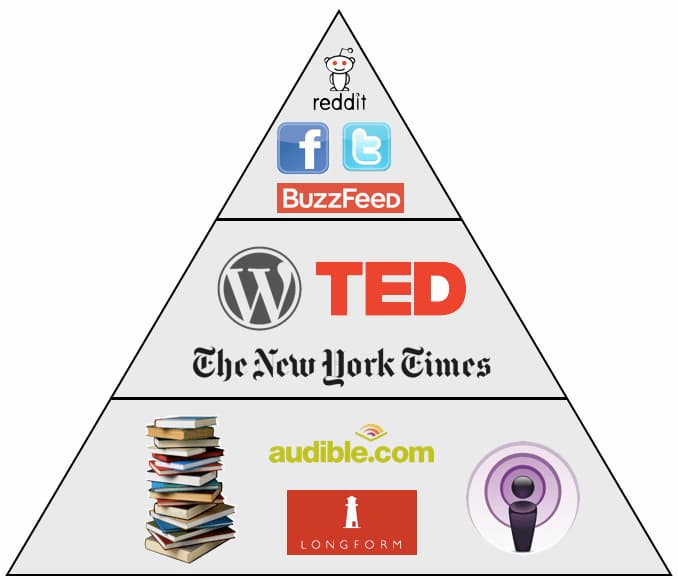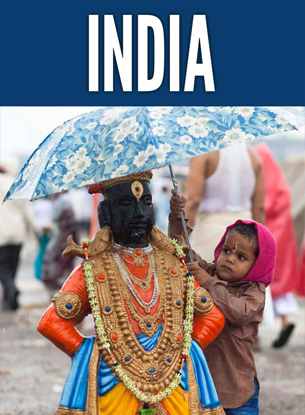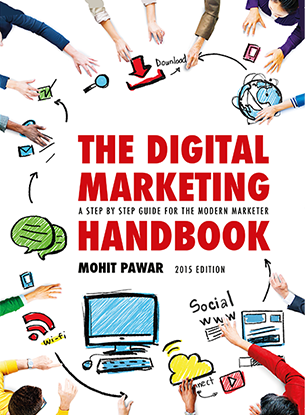
People these days are focused on being healthy. Being healthy depends on what you eat, how you think and the environment you live in. This focus on health has come after a large part of our generation felt the heat of looming health challenges of the 21st century.
Today, we are eating more than our ancestors did. We are also consuming a lot more information than we should be. The basic drivers are availability and affordability.
Just like easy availability of junk food does not mean that we should eat it; easy access to free information (apparently so, we, in fact, get information in exchange of time which is limited in nature) does not mean that we spend all or most of our waking hours consuming information.
The web is the primary source of information for young educated population today. It lets you move from page to page, website to website due to its hyperlinked nature. This hyperlinked nature is beauty as well as the challenge of the web. Somebody who is connected can continue going on for years at one go if that was humanly possible. Same is with TV there is an incessant stream of channels and programs more than what anybody can consume.
This is where the power of choice should come in force. We as human beings are given this power to exercise restraint and also to take decisions. One got to draw a line where to stop, and decide how what and when to consume – whether it is food or information?
What does overconsumption of information do?
First and most important – it takes time. Time is a limited commodity and needs to be used judiciously. We all are provided with 24 hours in a day’s account. When we consume the information we invest this valuable resource. It needs to be spent intelligently. If information is your business then it is ok to spend more time than usual on this pursuit otherwise exercise restraint.
It fills your head at times with unwanted info and fills the space that would otherwise have been used to create something and make your life better. Does knowing about a landslide in a distant country help you really? OK, you can show and pray for those affected. What beyond that? If you are really concerned about humanity and a cause in particular — do something about that situation —send money, invent something that helps the people in question. It will bring more satisfaction to you.
Information types
Long form and short form – emails, phone calls, and micro-updates (twitter). Then you have books, article, essays, online and offline. Also, movies, news related items and mix of programs served on cable TV channels. You have information that can benefit you, one that will benefit others, something that you respond to, that you need to pass on.
Junk or healthy?
Like food, information can be junk or healthy. Junk information does not contribute to shaping your day or life. It is mostly news-like which will have no significance tomorrow. It is good to know about world affairs but not everybody needs to know everything. The information consumption needs for a politician are different from what it will be for an actor. Similarly for a teacher and a marketer they are different as they are for a CEO. We will go in detail about the information need of different individuals at some other time.
Better if we consume healthy information and also aim for balance. We do it by intelligent consumption.
Intelligent Consumption
To get on this path;
1. First, decide your learning needs:
We have touched upon this before. A CEO running a corporation or a start-up need to study trade journals to keep a tab on competition and also look at strategic reports to decide on the direction for the company.
2. Identify medium:
We use various media for information — paper, web, TV, radio. Among book reading people there has been a shift from paper reading to e-book readers. Do not push yourself to use the internet if you like reading a book or magazine in print or vice versa.
3. Decide on sources:
For books, the NY Times bestseller list is a good lead to follow. For an RSS feed of blogs choose a small mix of leading thinkers, peer group writers, emerging voices. Be open to something you stumble upon. Magazines – pick one each on the world and national affairs if that is what interests you — add 1 or 2 more. If you like to read only one then go for Reader’s Digest. Once in a while also take time to go for some live seminars.
4. Choose a healthy mix:
Choose information that enriches you (books, essays that have stood the test of time — you can start with — How to Live on 24 Hours a Day by Arnold Bennett – seminars, workshops. Keep in mind that good learning mix is made of experiential learning, reading from authentic sources and connecting with mentors. Give some time to music, movies, and news also.
5. Set time:
Fix a time that you want for consumption. It may be 1-2 hours every day or 10 hours per week.
6. Reflect and record:
Reflect on what you learn and record it. Refection will make sure that you get the best out of your time and recording makes sure that your hard disc is free for future learning. Writing is a good way to record what you learn and it is simpler than people think it is.
I do not expect everyone to follow it by book but when you follow it for some time it will be like second nature.
How much is too much?
If it interferes with your day to day work and takes your core action away then it is too much.
How to get the best out of it?
Simple, consume with a motive to create and to gain insights. This way you give information your own flavor and also get into the habit of shipping.
Information gathering and consumption
At times people need to do information gathering for some research project. In such a situation assign two days for information gathering only rather than consumption. Then take another day to put the information together. But do not burden yourself with the task of information consumption at the time of gathering. Think of this as a time of setting the table for dinner rather than the act of eating.
Keep the chatter down
Go on information fast from time to time. Your peace of mind and work at hand is more important than info-consumption. Your family, work that pays your bills, exercise that helps you stay fit is more important than any words written on a website; I say this for MohitPawar.com as well.
So stop looking at this website and go do what needs to be done, take a walk, call friends; get home early to be with family. If you are home today then take your family out or go hang out with your friends. If you happen to be reading this late at night then go get some sleep. You need it more than consuming some random bit of info. It will be there tomorrow so you can come back and read.
Sure right kind of information helps you uplift your mood, crystallize your plans or act as a reminder like this article but being happy, healthy and productive should come first. This space will welcome you as much as it does now.
Enough said. To your happiness!
How do you consume information? Is there a plan to it or you just consume what comes your way?


